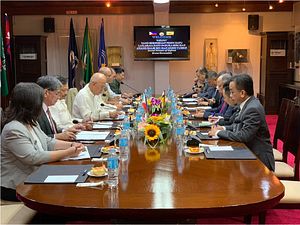Last week, the Philippine army chief paid an official visit to Brunei. Though the trip was just one engagement within the security relationship between the two Southeast Asian states, it nonetheless spotlighted some of the ongoing activity within this aspect of ties.
As I have noted before in these pages, Brunei and the Philippines have a defense relationship as part of their broader bilateral ties. Apart from the usual components of defense ties among countries such as visits and exercises, there are also more unique aspects as well in Brunei-Philippines relations, such as the fact that Brunei has some personnel deployed as part of the International Monitoring Team (IMT) headquartered in Cotabato city in Mindanao to help monitor the peace process ongoing in the southern Philippines.
That has continued on into 2019 as well amid wider domestic and foreign policy developments for both countries. For instance, just last month, Brunei’s second minister of defense, Haji Awang Halbi bin Haji Mohamad Yussof, was in the Philippines where he engaged with top officials including Defense Secretary Delfin Lorenzana on the state of bilateral defense ties and potential future collaboration as well.
Last week, the defense aspect of the relationship was in the headlines again with the Philippine army chief’s visit to Brunei. Macairog S. Alberto, the commanding general of the Philippine Army, was on a trip to Brunei which constituted his first visit to the Southeast Asian state since he assumed his current role last October.
Alberto’s trip, which lasted from September 15 to September 17, consisted of a series of interactions. In terms of meetings, he met with a range of officials including Brunei’s second minister for defense (the defense minister portfolio in Brunei is held by the head of state Sultan Hassanal Bolkiah) as well as the commander of the Royal Brunei Armed Forces (RBAF).
Per Brunei’s defense ministry (MINDEF), the discussions focused on assessing the state of bilateral defense ties as well as other issues of issues of mutual interest. Those discussions also underscored the importance of further enhancing security relations in the interests of not only both countries, but for the region as well.
Unsurprisingly, few additional specifics were publicly disclosed about the private deliberations of the two sides. Nonetheless, these interactions will continue to be important to watch to get a sense for how both countries are looking to advance the defense aspect of their relationship in the months and years ahead amid wider domestic and foreign policy developments.
































